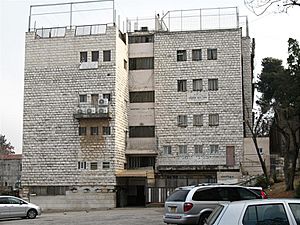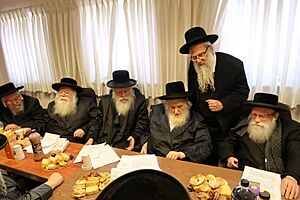Edah HaChareidis facts for kids
|
העדה החרדית
|
|

Headquarters In Jerusalem
|
|
| Formation | 1918 |
|---|---|
| Founder | Rabbi Yosef Chaim Sonnenfeld, Rabbi Yitzchok Yerucham Diskin |
| Founded at | Jerusalem |
| Headquarters | Jerusalem |
|
Membership
|
40,000 |
|
Official language
|
Yiddish, Hebrew |
|
Chief Rabbi
|
vacant |
|
Head of Court
|
Rabbi Moshe Sternbuch |
| Publication | HaEdah, Madrich HaKashruth |
| Secessions | Agudat Yisrael, Neturei Karta, Karlin, Khal Adas Yerushalayim |
| Affiliations | Haredi Judaism |
|
Formerly called
|
Ashkenazi City Council |
The Charedi Community of Jerusalem (in Hebrew: haEdah haCharedit) is a large community of Haredi Jews living in Jerusalem. Haredi Jews are very religious and follow traditional Jewish laws strictly. This community acts like a separate organization for its thousands of member families.
The community has its own leaders, including a chief rabbi and a religious court. It also provides important services for its members. These include making sure food is kosher (prepared according to Jewish law), running ritual baths called mikva'oth, and helping people in need.
The group was started in 1918 by Ashkenazi Jews (Jews from Central and Eastern Europe) in Jerusalem. They wanted to live separately from the growing Zionist movement, which aimed to create a modern Jewish state. Because of their strong beliefs, the community does not take any money from the Israeli government and does not allow its members to vote in Israeli elections. They often protest against things they believe are against their religious laws.
Contents
History of the Community
The Charedi Community was founded in 1918 by Rabbi Yosef Chaim Sonnenfeld and Rabbi Yitzchok Yerucham Diskin. At first, it was called the Ashkenazic City Council. Its goal was to be independent from Zionist groups that were becoming more powerful in Jerusalem at the time.
Rabbi Sonnenfeld became the community's first chief rabbi in 1920. He led the group until he died in 1932. Over the years, the community had several important leaders. One of the most famous was Grand Rabbi Joel Teitelbaum of the Satmar Hasidic group. Even after he moved to the United States, he was still considered the chief rabbi of the community in Jerusalem.
The community's strong beliefs sometimes led to disagreements with other Jewish groups. For example, in 1945, some members who were part of a group called Agudat Yisrael were asked to leave because they were seen as working too closely with Zionist organizations.
Beliefs About Zionism
The Charedi Community is known for its strong anti-Zionist beliefs. Zionism is the movement that supported the creation of the modern State of Israel. The community believes that a Jewish state should only be established after the Messiah comes. They see the modern, non-religious government of Israel as going against Jewish law.
This belief comes from the teachings of their former leader, Rabbi Joel Teitelbaum. He wrote a famous book called Vayoel Moshe that explains these ideas. Because of this, the community:
- Does not allow its members to vote in Israeli elections.
- Does not accept money from the Israeli government for its schools or other needs.
- Does not recognize Israel's Independence Day and instead treats it as a day of sadness.
Members of the community have often held protests against actions by the Israeli government or public that they see as breaking religious laws.
Community Life and Influence
Today, about 15,000 families are part of the Charedi Community. They mostly live in neighborhoods in northern Jerusalem, like Mea Shearim, and in the city of Beit Shemesh. There are also members in other Israeli cities like Bnei Brak and Safed.
The community is made up of several different Haredi groups, including:
- Satmar
- Dushinsky
- Toldos Aharon
- Toldos Avrohom Yitzchok
- A part of the Breslover Hasidim
The community publishes a weekly magazine in Hebrew called HaEdah ("The Community"). The magazine shares the leaders' views on current events and includes articles about Jewish teachings.
Community Services
The Charedi Community provides many services for its members to help them live according to their strict religious standards.
Kosher Food Supervision
The community is famous for its high-quality kosher food supervision. The certification is known as the Badatz, which is a short name for their religious court (Beis Din Tzedek). Many people in Israel, even those outside the community, trust the Badatz stamp on food products as a sign of the highest level of kosher quality.
Other Services
The community also runs several other councils to manage different parts of religious life:
- A council that makes sure farming follows Jewish laws during the Shemita (sabbatical) year.
- A council that maintains the eruvin in Jerusalem and Beit Shemesh. An eruv is a special boundary that allows people to carry things outdoors on the Sabbath.
- A council that supervises the work of scribes who write holy texts.
- A council that makes sure financial businesses follow Jewish laws about loans and interest.
Leadership and Rabbinical Court
The highest authority in the community is its rabbinical court, the Badatz. This court makes decisions on religious law, money matters, and family issues.
The court is led by two main figures:
- The Ga'avad (Chief Rabbi): This is the highest position.
- The Ra'avad (Head of the Court): This is the second-in-command and usually takes over as Ga'avad when the position becomes vacant.
As of 2025, the position of Ga'avad is vacant. The Ra'avad is Rabbi Moshe Sternbuch.
Past Chief Rabbis
The community has been led by a series of respected rabbis since it was founded.
- 1920–1932: Rabbi Yosef Chaim Sonnenfeld
- 1932–1948: Grand Rabbi Yosef Tzvi Dushinsky
- 1947–1953: Rabbi Zelig Reuven Bengis
- 1953–1979: Grand Rabbi Joel Teitelbaum of Satmar
- 1979–1989: Rabbi Yitzchok Yaakov Weiss
- 1989–1996: Rabbi Moshe Aryeh Freund
- 1996–2002: Grand Rabbi Yisroel Moshe Dushinsky
- 2002–2022: Rabbi Yitzchok Tuvia Weiss
Images for kids
See also
 In Spanish: Edah Haredit para niños
In Spanish: Edah Haredit para niños
 | Kyle Baker |
 | Joseph Yoakum |
 | Laura Wheeler Waring |
 | Henry Ossawa Tanner |



